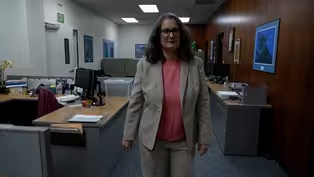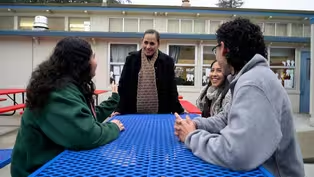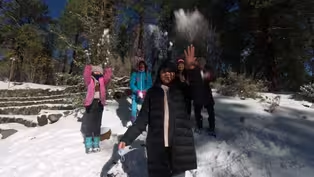Inside California Education
Soils, Seeds, and Science
Clip: Season 5 Episode 2 | 6m 12sVideo has Closed Captions
Visit a Central Valley school where students get a weekly agriculture lesson.
Visit a Central Valley school where students get a weekly agriculture lesson as part of their science studies.
Problems playing video? | Closed Captioning Feedback
Problems playing video? | Closed Captioning Feedback
Inside California Education is a local public television program presented by KVIE
Funding for the Inside California Education series is made possible by the California Lottery, SchoolsFirst Federal Credit Union, Stuart Foundation, ScholarShare 529, and Foundation for the Los Angeles Community Colleges.
Inside California Education
Soils, Seeds, and Science
Clip: Season 5 Episode 2 | 6m 12sVideo has Closed Captions
Visit a Central Valley school where students get a weekly agriculture lesson as part of their science studies.
Problems playing video? | Closed Captioning Feedback
How to Watch Inside California Education
Inside California Education is available to stream on pbs.org and the free PBS App, available on iPhone, Apple TV, Android TV, Android smartphones, Amazon Fire TV, Amazon Fire Tablet, Roku, Samsung Smart TV, and Vizio.
Providing Support for PBS.org
Learn Moreabout PBS online sponsorship♪♪♪ Narr: 20 minutes outside of Fresno sits a country school that's bringing learning to life.
Fairmont is a T-K through 8th grade school in the growing and diverse Sanger Unified School District.
What was once a small, rural school is now busting at the seams.
Parents are eager to send their children to Fairmont because they say this school is doing something unique.
Christine: So, our program involves all our students and they, um, come to ag science classes every week.
And so, we do plant science, animal science, we do ag marketing, ag business, ag technology.
We cover the drought.
Christine: I know that there was stuff that you were gonna need.
Narr: Christine Torosian-Klistoff heads Fairmonts Agriculture program.
Its the first program of its kind in California, where all students, from the little ones in T-K to the 7th and 8th graders learn science standards through an ag lens.
Fairmont is building curriculum they hope will be adopted and used in classrooms across California.
Christine: If you're going to teach about plant genetics instead of keeping it small, why not teach about lets say our... our top commodities in the valley, which here in the San Joaquin Valley, you know, almonds, pistachios, and grapes.
Why not teach those things with that ag lens?
So, our idea is to give a blueprint, of the science standards, so that all schools can take it back and use it.
Narr: The hands on science lessons are designed to provide students with an understanding of agriculture and its impact on the San Joaquin Valley, one of the world's top food producing regions.
Jared: Typically, the system is set up to ensure that kids who enter high school have options and opportunities to be successful, exposure to different programs like automation or robotics or agriculture, things of that sort.
We reject that notion that kids have to wait till high school to get access to those options and opportunities.
Narr: On this day, 7th and 8th grade students are rotating through learning stations, designed to teach them how to analyze, evaluate, and problem-solve as a team.
Students are learning how to stitch up a wound using bananas.
They look at bugs through microscopes.
Discover safe ways to fertilize plants.
Get their hands dirty with soil samples, and plant vegetables in their school garden.
Payton: This is probably the best class on campus.
I mostly look forward to, like, learn something new.
Like, all-- like, cause every time we come in here and were never taught the same thing over and over, its always something new and I just, I always cant wait to know what were gonna learn next.
Ty: I would say the ag program at Fairmont has made school better for me because it helps me with, like, when I'm reading and collecting data, it helps me collect data better in class.
Narr: In addition to the weekly Ag Science Lab students are exposed to technology through engineering classes.
Here, students have access to computers where they learn coding.
They work with drones and 3-D printers.
They have a robotics team and even do small welding projects.
Tisha: I think through our program, theyre going to have an amazing foundation and knowledge base about agriculture and the industry.
Um, not just within the means of plant and animal science, but within the means of looking at energy conservation, how to run a business, how to do the marketing, how to do all of that.
Its important for them to understand even as basic as how do we get our food on our plates?
How are we eating every single day?
But for them to be able to be provided with career exposure to different options and opportunities that are available to them within that ag industry.
Um, outside of just you know the basic farmer, I feel like a lot of kids grow up thinking agriculture is about... just about farming, but its not.
Theres so much more science technology and um, engineering that is involved in it.
Narr: Fairmont School is in the process of growing their agricultural program.
Plans include an 8 million dollar two acre complex that will house areas dedicated to plant science and animal science, along with a 4,000 square foot innovation lab that will be used to study water energy and robotics.
Jared: Our ag complex is going to be a blend of tradition and innovation.
And that's a unique combination that really serves this population, that serves this valley.
We started a capital campaign five years ago called Grow the Legacy, and that is all of our community members coming together and saying, this is so important.
We want to help fundraise.
Narr: The AG complex will be available to all 8,000 elementary school students throughout Sanger Unified, and it will be a host site for robotics and other statewide competitions.
It's all designed to help Fairmont in their goal of spreading ag education throughout the Golden State.
Christine: Agriculture is so important to our valley, to our state.
And by educating our youth, all of them, whether its here at Fairmont, if we could start the blueprint here and spread... spread that out for everyone.
It could change education; it could change the way of agriculture.
It is our future.
Annc: All of the classes in Fairmont Elementarys ag program meet well-established standards for STEM learning ‘ Science, Technology, Engineering and Math.
And this is just one of many programs designed to promote learning and careers in agriculture.
Perhaps one of the best known is Future Farmers of America, or FFA, a national organization.
But here in California, the California Foundation for Ag in the Classroom offers teachers and students free access to lesson plans, study guides, and videos, including virtual tours of farms across the state.
Day in the Life: Chief of Wellbeing
Video has Closed Captions
Clip: S5 Ep2 | 3m 29s | Spend a “day in the life” with the Chief of Wellbeing of Los Angeles County schools. (3m 29s)
Video has Closed Captions
Clip: S5 Ep2 | 6m 21s | Discover how graduating seniors in California can earn a State Seal of Biliteracy. (6m 21s)
Video has Closed Captions
Clip: S5 Ep2 | 5m 26s | Visit an outdoor science school in Southern California. (5m 26s)
Providing Support for PBS.org
Learn Moreabout PBS online sponsorship
- News and Public Affairs

Top journalists deliver compelling original analysis of the hour's headlines.

- News and Public Affairs

FRONTLINE is investigative journalism that questions, explains and changes our world.












Support for PBS provided by:
Inside California Education is a local public television program presented by KVIE
Funding for the Inside California Education series is made possible by the California Lottery, SchoolsFirst Federal Credit Union, Stuart Foundation, ScholarShare 529, and Foundation for the Los Angeles Community Colleges.


